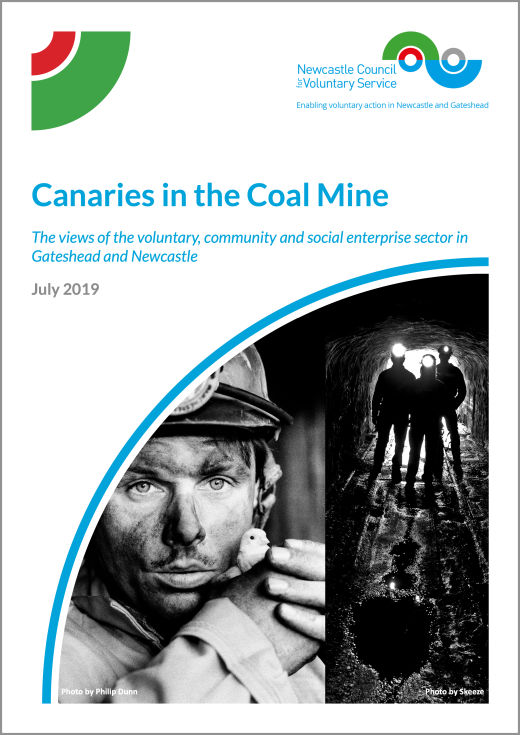Author: Martin Gollan
Edited by Sally Young
The views of the voluntary, community and social enterprise sector in Gateshead and Newcastle
In their eighth report Newcastle Council for Voluntary Service (NCVS) asked organisations about their status, funding, achievements and challenges and what pressures and aspirations they had identified for the future. More importantly, they asked about what issues were impacting the people they supported within their local communities.
And, this year Newcastle CVS asked an additional question around food poverty, following up from their study in December 2018.
118 voluntary and community organisations completed the survey and they represent a reasonable reflection of the local sector.
In Gateshead, there are around:
- 851 registered charities operating across, but not necessarily based in Gateshead
- 10 mutuals and cooperatives
- 25 CICs (Community Interest Companies)
- Between 1,300 – 2,000 small, local groups, activities and organisations
In Newcastle there are around:
- 1,102 registered charities operating across, but not necessarily based in Newcastle
- 24 mutuals and cooperatives
- 117 CICs
- Between 2,500 – 3,000 small, local groups, activities and organisations
The key issues identified were:
- Funding and sustainability continues to be the most pressing issue for voluntary and community organisations in Gateshead and Newcastle, regardless of their size.
- Nearly eight out of ten organisations noted an increase in demand for their services in the last year; this has been a consistent figure for a number of years. Many organisations reported a year on year growth in demand for several years.
- The recruitment and retention of volunteers continues to be a significant challenge, as there appears to be a greater movement of people into and out of roles. This is despite the Government funding initiatives such as National Citizen Service and the Do-It digital volunteering information. So although there has been an overall increase in the numbers of people volunteering, the retention rates are dropping.
- The impact of welfare reforms and personal debt is affecting many different communities and organisations, not just those who are advice givers.
- Funding is becoming increasingly precarious for medium-sized organisations as they cannot compete for contracts as the scale is too big, and value too small, but a lot of time is spent in raising relatively small amounts of money from trust funds.
- Optimism continues to shine through with a third of organisations anticipating they will increase the numbers of staff, two-thirds increase the numbers of volunteers and over half wish to increase the numbers of services they offer in the year ahead.
- Innovation is still happening - seven out of ten organisations had developed new areas of service, projects, initiatives and events in the last year.
- The retraction of the state, particularly in mental health and social services, is getting worse as authorities revert to providing ‘only statutory services’. More time is now spent in advocating for public services for people who should receive them.
- The relationships with the public sector varied with organisations; many had no contact, some had good relationships, but for others there were issues of independence, power and autonomy. Often only large organisations had the capacity to engage.
- Increasing awareness about shifting relationships and the role of civil society in facing what 2020 and the years ahead will bring. There is a sense of change and challenge and the need to do things differently.
- Grants from charitable foundations and trusts were the most common form of income for small and medium-sized organisations.
- The normalisation of poverty and food banks; the acceptance of austerity as the normal position. There is an apparent lack of challenge to why we have reached this position.
- The danger of charities becoming the de facto state, without the resources, powers or law. As the state retreats to provide only statutory services, it is assumed charities and volunteers will ‘step in and step up’, else provision is lost.
- Concerns about how the North East resources compare to the rest of the UK, and how we are slipping further away. The impact of Brexit and the potential benefit of the North of Tyne Combined Authority are unknowns.
- Children and young people were repeatedly identified by many organisations as a group where further resources needed to be invested.
- The shift to more contracts of lower value, greater competition for grant funding, increases in the National Living Wage, pension contributions and the general cost inflation was putting further pressure on charity resources.
- More people with increasing needs and increasing complexity of needs. This was noted by general charities and community organisations, which don’t necessarily have the skills and experience to deal with people who have very complex needs.
- Nearly half of the respondents made referrals to food banks; this has become an everyday activity for many charitable organisations.
Read and download the free pdf in your browser, link below.

The publisher is Newcastle Council for Voluntary Service (NCVS).
Canaries in the Coal Mine © Newcastle Council for Voluntary Service 2019.
All Rights Reserved. No part of this paper may be reproduced in any form without permission from the publisher except for the quotation of brief passages in reviews.
